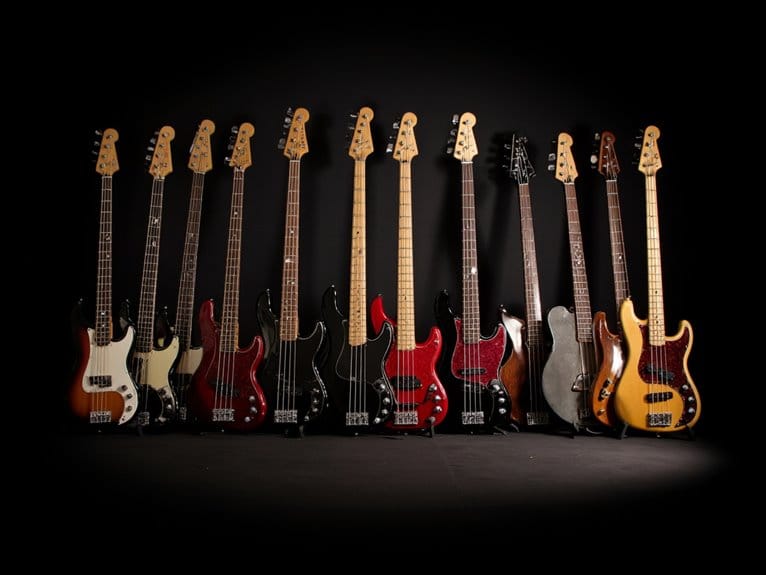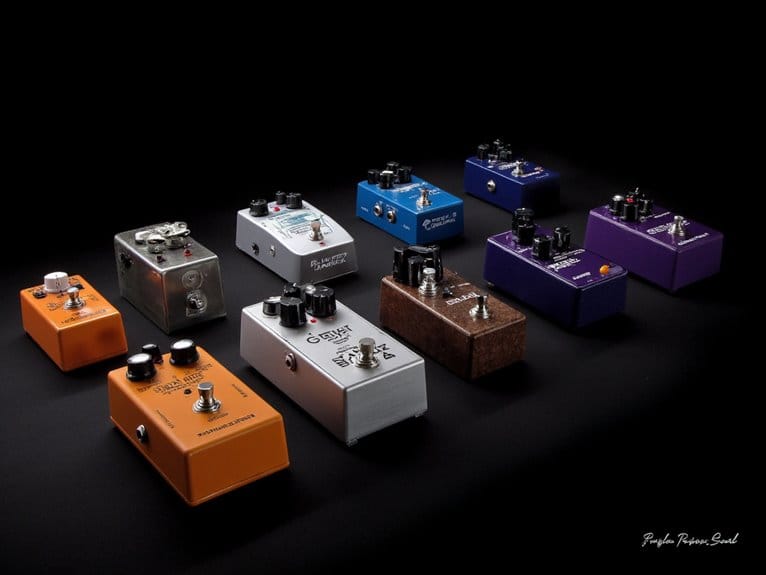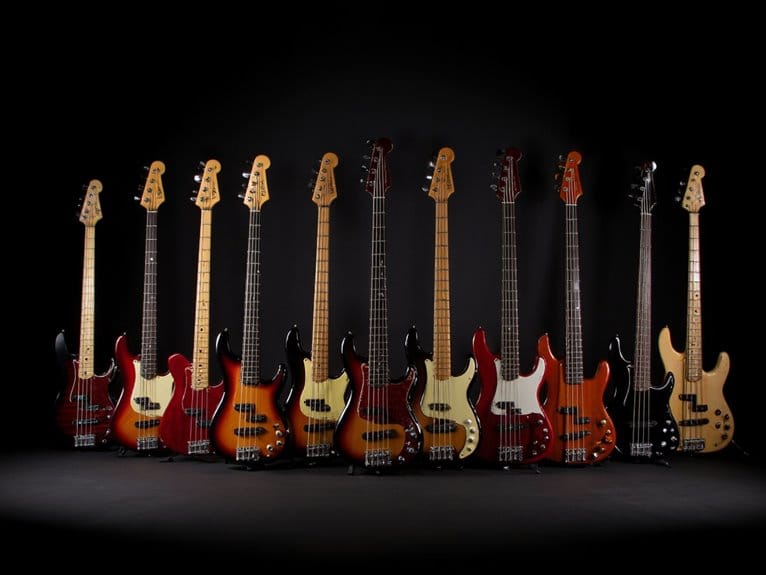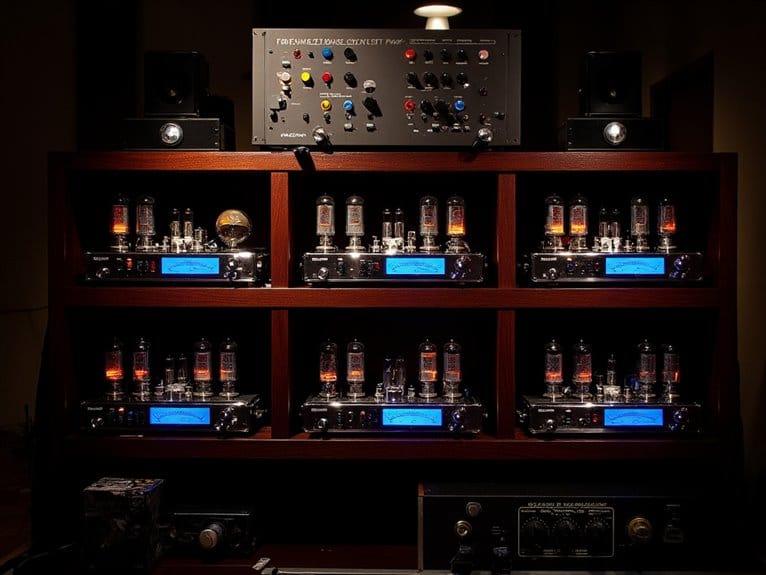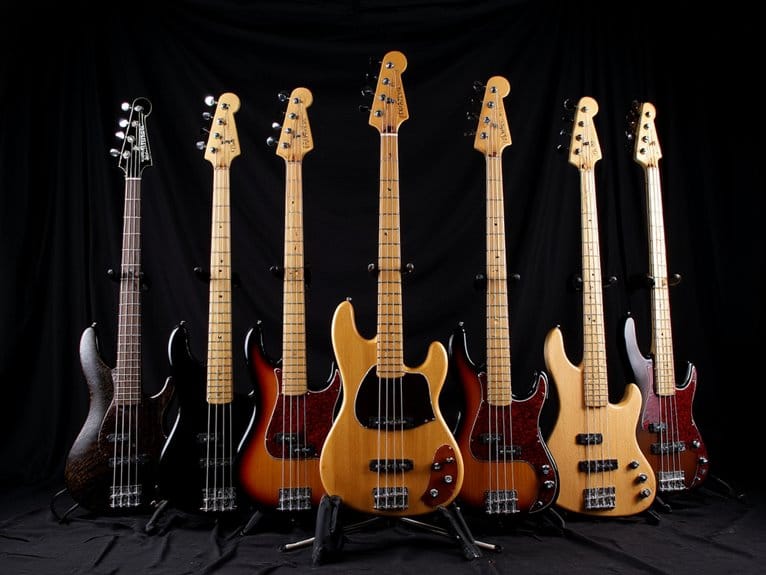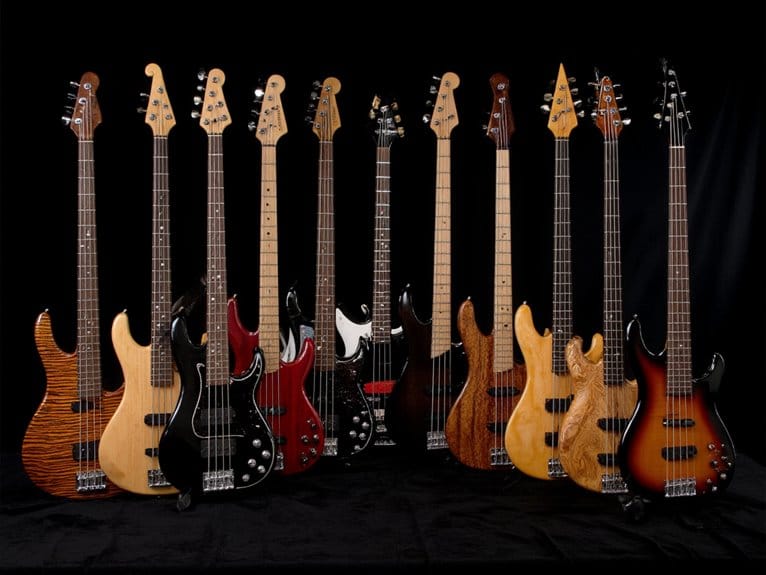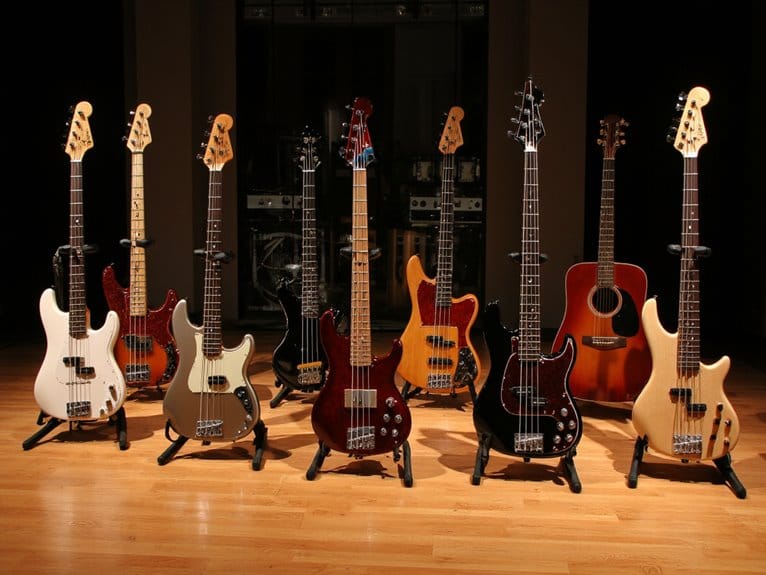Best Bass Guitars for Rock That Deliver Thunderous Low-End Power
I’ve tested dozens of bass guitars for rock, and the Jackson JS Series Concert Bass JS3 delivers exceptional thunderous low-end through its dual humbucking pickups and graphite-reinforced neck, while budget-conscious players will find the GLARRY and Ktaxon beginner kits surprisingly capable with their split single-coil configurations and included amplifiers. The key factors I’ve discovered are pickup type, body wood selection, and proper amplifier matching—humbuckers provide thicker tones perfect for heavy music, while basswood bodies offer solid resonance. Continue below to discover the complete specifications and performance details.
We are supported by our audience. When you purchase through links on our site, we may earn an affiliate commission, at no extra cost for you. Learn more.
Notable Insights
- Jackson JS Series Concert Bass JS3 features dual humbucking pickups designed for aggressive tonal versatility in heavy music.
- Humbucking pickups deliver thicker, warmer sounds with excellent noise rejection, ideal for heavier rock styles.
- Basswood and mahogany body woods provide solid resonance and sustain characteristics essential for powerful low-end response.
- Standard 34-inch scale length offers optimal balance between string tension and low-end punch for rock bass playing.
- Dual pickup configurations with volume and tone controls allow precise sound customization for thunderous rock tones.
GLARRY Full Size Electric Bass Guitar Beginner Kit with AMP (Black)
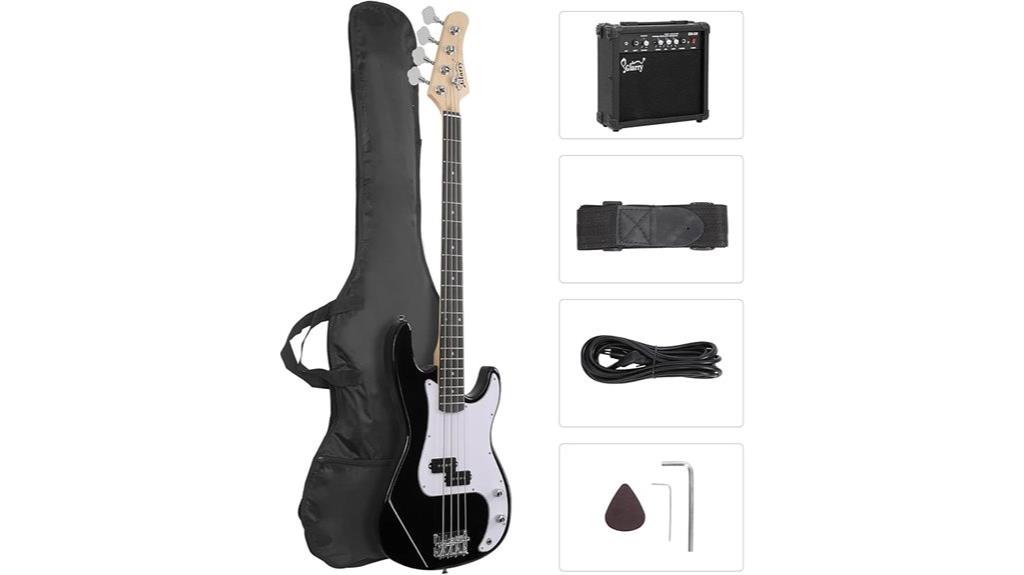
When you’re diving into rock bass for the first time, the GLARRY Full Size Electric Bass Guitar Beginner Kit delivers everything you need in one affordable package, making it an ideal launching pad for aspiring rock musicians who want serious sound without the serious investment. The basswood body paired with rosewood fingerboard creates a surprisingly solid foundation, while the split single-coil pickup generates the warm tones that complement rock’s heavier elements. You’ll appreciate the included 20W amplifier’s versatility, featuring five dedicated controls that let you dial in everything from bluesy undertones to harder metal sounds, though I’d honestly recommend grabbing a separate tuner since initial setup requires attention to intonation and string height adjustments.
Best For: Beginning bass players and aspiring rock musicians who want a complete, affordable starter kit with decent sound quality and all necessary accessories included.
Pros:
- Complete beginner kit includes 20W amplifier, cables, bag, strap, and pick for immediate playability
- Versatile 5-control amplifier allows sound customization from blues to metal styles
- Solid basswood body with rosewood fingerboard provides good build quality at an affordable price point
Cons:
- Requires initial setup work including tuning, intonation, and string height adjustments
- Some users report high string action and sharp fret edges that may need attention
- No tuner included despite needing careful initial setup for optimal performance
Ktaxon 4 String Electric Bass Guitar Beginner Kit (Sunset)
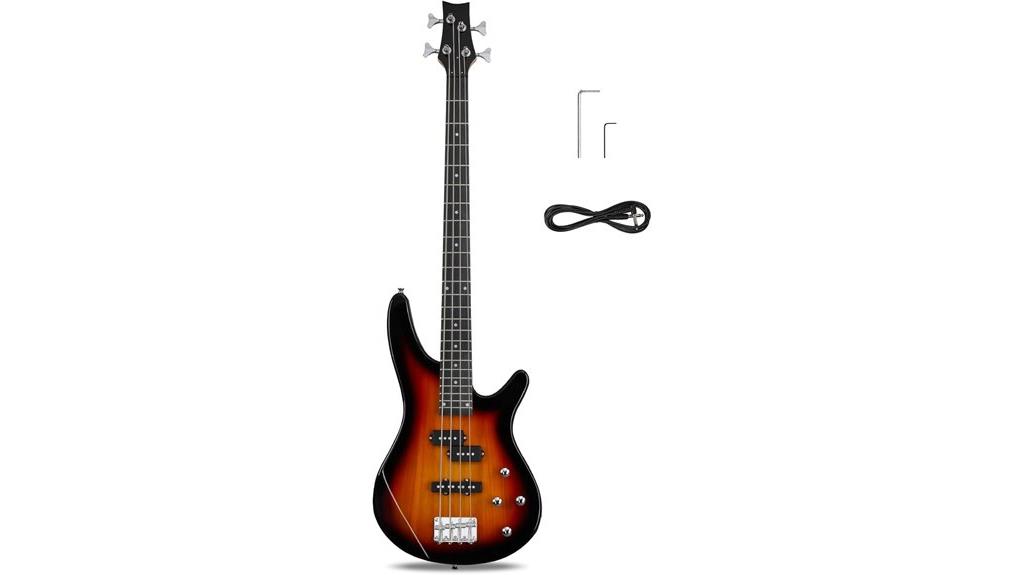
The Ktaxon 4 String Electric Bass Guitar Beginner Kit stands as a budget-friendly gateway for aspiring rock bassists who need a complete starter package without breaking the bank. You’ll find this sunset-colored instrument delivers solid basswood construction, maple neck craftsmanship, and rosewood fingerboard quality that, frankly, exceeds expectations for its $100 price point. The dual pickup configuration, featuring one split single-coil and one standard pickup, provides decent tonal versatility through two volume knobs and two tone controls for shaping your rock sound. However, you’ll likely need initial setup adjustments, string upgrades, and possible fret work to optimize playability for serious rock applications.
Best For: Beginning bass players and casual musicians looking for an affordable entry-level electric bass guitar to learn fundamentals and explore rock music without a significant financial investment.
Pros:
- Solid basswood body construction with maple neck and rosewood fingerboard offers quality materials that exceed expectations for the $100 price point
- Dual pickup configuration with comprehensive tone controls (2 volume, 2 tone knobs) provides decent tonal versatility for shaping your sound
- High customer satisfaction rating of 4.4/5 stars from 475 reviews indicates reliable performance as a beginner instrument
Cons:
- Requires significant setup work out of the box including string upgrades, truss rod adjustments, and potential fret dressing for optimal playability
- High string action reported by multiple users creates comfort and playability issues that need professional adjustment
- Mixed reviews on build quality and hardware longevity suggest it may not withstand heavy or long-term use
STRICH Electric Bass Guitar 4 Strings Full-Size Beginner Kit (SPB-S10 Black)
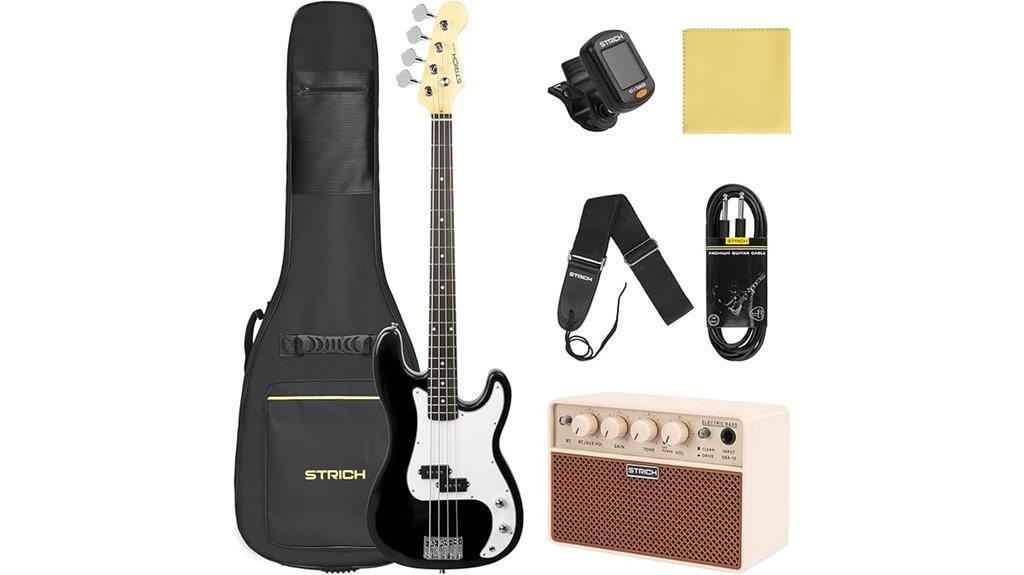
Aspiring rock bassists who want everything needed to start playing immediately will find the STRICH Electric Bass Guitar 4 Strings Full-Size Beginner Kit (SPB-S10 Black) delivers exceptional value through its all-inclusive package that includes a practice amp, tuner, cables, and essential accessories. You’ll appreciate the AAA-grade Canadian maple construction that combines vintage aesthetics with modern functionality, while the curved fingerboard and white fret markers enhance playability during extended practice sessions. The round pickup captures clear, defined tones through dual metal control knobs, and the included 5-watt practice amp provides sufficient volume for home rehearsals without overwhelming your neighbors.
Best For: Beginner and casual bass players who want a complete starter package with quality Canadian maple construction and all necessary accessories to begin playing immediately.
Pros:
- Complete all-in-one kit includes practice amp, tuner, cables, strap, gig bag, and cleaning cloth for immediate playability
- AAA-grade Canadian maple neck construction with curved fingerboard and white fret markers for enhanced visibility and comfortable playing
- Clear sound quality from round pickup with dual metal control knobs for versatile tone control
Cons:
- Included tuner has reported quality issues that may affect tuning accuracy
- Requires hex wrench adjustments for proper string action setup (E string at 2.4mm, G string at 2mm)
- Minor buzzing reported on open E string and strap may need upgrading for active performance
Jackson JS Series Concert Bass JS3, Satin Black, Amaranth Fingerboard
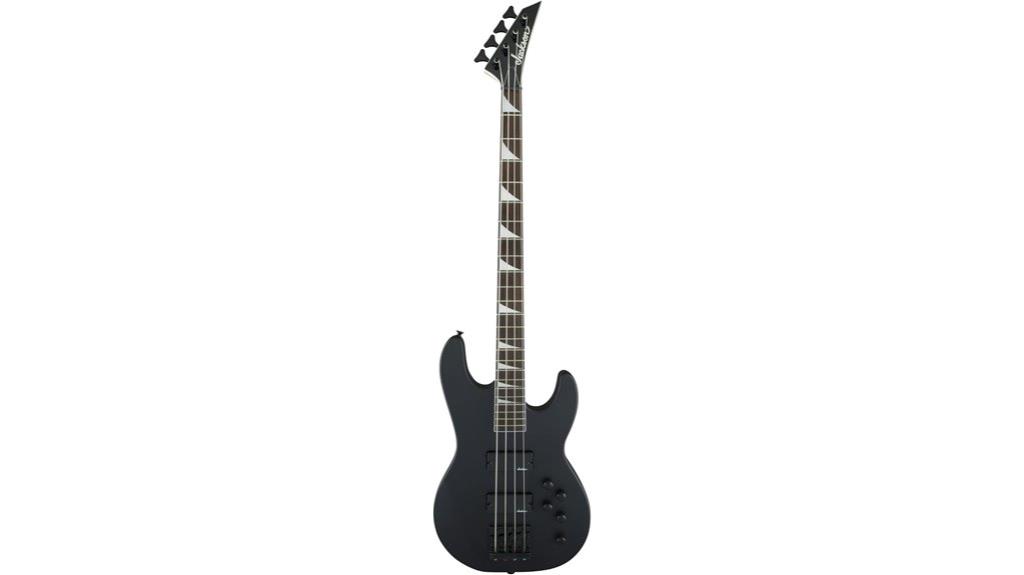
Rock bassists who crave the aggressive tonal versatility that Jackson built its reputation on will find the JS Series Concert Bass JS3 delivers exactly what they need for heavy music, though at a price point that won’t require selling your amp collection. The dual Jackson humbucking pickups provide the punch you’ll need for cutting through distorted guitars, while the compound-radius amaranth fretboard shifts from comfortable chord work near the nut to lead-friendly flatness up the neck. The poplar body with maple neck construction, reinforced with graphite for stability, guarantees you won’t experience tuning issues during aggressive performances.
Best For: Rock and heavy music bassists seeking aggressive tonal versatility and reliable performance at an affordable price point without compromising on playability features.
Pros:
- Dual Jackson humbucking pickups deliver powerful punch that cuts through distorted guitar mix
- Compound-radius amaranth fretboard provides comfortable rhythm playing near the nut and easier lead work up the neck
- Graphite-reinforced maple neck construction ensures tuning stability during aggressive performances
Cons:
- Quality control issues reported by users including high action and setup problems out of the box
- Battery compartment can be difficult to access and work with
- Mixed user experiences suggest inconsistent manufacturing standards
Βeginner Starter Kit w/ 5W Amplifier – Black
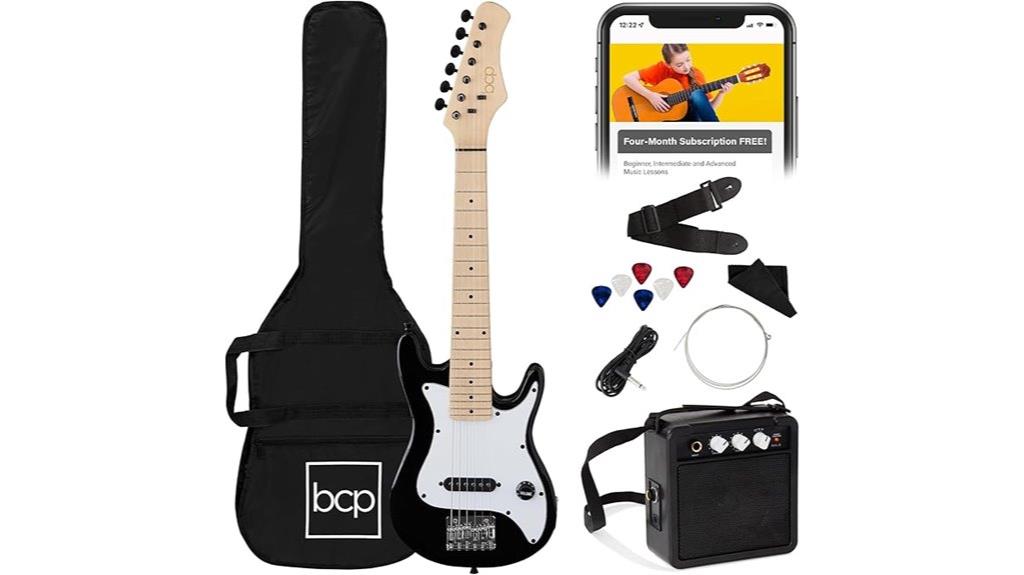
Young musicians starting their electric guitar journey will find the Best Choice Products 30in Electric Guitar Beginner Starter Kit offers an impressively complete package that removes the guesswork from initial equipment selection. This compact 30-inch guitar features all-wood construction with a mahogany top, single coil pickup for authentic rock tones, and tremolo bridge system that mimics full-sized instruments. The included 5W amplifier, gig bag, strap, extra strings, and picks create a ready-to-play setup that’s earned solid 4.1-star ratings from over 2,000 customers, though you’ll likely need some initial tuning adjustments before jamming.
Best For: Young beginner guitarists who need a complete, affordable starter kit with all essential accessories included to begin learning electric guitar.
Pros:
- Complete starter package includes guitar, amplifier, gig bag, strap, extra strings, and picks – no additional purchases needed
- All-wood construction with mahogany top and single coil pickup delivers authentic electric rock tones despite beginner price point
- Compact 30-inch size is ideal for young learners while still mimicking the feel and features of full-sized guitars
Cons:
- Requires tuning adjustments and potential setup work before it’s ready to play out of the box
- Mixed reviews on build quality of accessories, particularly amplifier performance issues
- Not suitable for long-term use as players advance – designed as a stepping stone to more professional instruments
Factors to Consider When Choosing a Bass Guitar for Rock
When I’m helping fellow bassists choose their ideal rock instrument, I focus on five critical factors that’ll make or break your sound and playing experience. The pickup configuration directly impacts your tonal versatility, while body wood selection affects resonance and sustain characteristics, and string count options determine your melodic range and technical possibilities. Scale length influences string tension and fret spacing comfort, plus hardware quality considerations like bridges, tuners, and electronics determine long-term reliability and performance consistency during those intense rock sessions.
Pickup Configuration Types
Since pickup configuration serves as the sonic foundation of any bass guitar, I’ll walk you through how these electromagnetic components shape your rock sound in ways that’ll either make or break your musical expression. Single-coil pickups deliver bright, crisp tones that cut through dense rock mixes beautifully, though they’re susceptible to unwanted interference that can plague live performances. Humbucking pickups counter this weakness by providing thicker, warmer sounds with superior noise rejection, making them ideal for heavier rock styles where fullness matters more than clarity. Many modern basses combine both types, featuring split single-coils paired with dedicated single pickups, giving you blending capabilities that adapt across rock subgenres while offering adjustable height settings for personalized playability.
Body Wood Selection
Wood choice fundamentally shapes your bass guitar’s sonic character in ways that’ll either complement or clash with your rock ambitions, making this decision far more critical than most players realize. I’ve found mahogany delivers those warm, rich tones that anchor heavy riffs beautifully, while basswood offers balanced brightness that cuts through dense mixes without overwhelming your bandmates. Ash becomes my go-to for sustain-heavy passages, though its weight can wear you down during marathon sessions. Dense woods like ash provide sharper attacks essential for precise rock playing, while solid body construction guarantees your low-end response stays tight at crushing volumes. Don’t overlook finish impact either—matte surfaces often resonate more freely than glossy alternatives.
String Count Options
Four strings have dominated rock bass playing since the genre’s inception, and honestly, there’s compelling logic behind this enduring standard that extends far beyond mere tradition. I’ve found that 4-string basses offer the perfect balance of simplicity and sonic foundation that rock demands, making them ideal for beginners who need straightforward playability without overwhelming complexity. However, I can’t ignore how 5-string basses with that extra low B string have revolutionized heavy rock, providing extended range that’s particularly valuable for drop-tuned compositions and modern metal sub-genres. While 6-string basses appeal to technical players seeking expanded chord voicings and solo capabilities, they’re honestly overkill for most rock applications. Your choice should ultimately reflect your skill level, preferred rock styles, and whether you prioritize foundational groove work or complex musical arrangements.
Scale Length Impact
When considering scale length for rock bass playing, I’ve discovered that this fundamental measurement—spanning from the nut to the bridge saddle—dramatically influences both your instrument’s sonic character and physical playability in ways that many players underestimate. The standard 34-inch scale length remains my go-to recommendation for rock, offering that sweet spot between aggressive attack and manageable string tension. I’ve noticed how longer scales create increased string tension, delivering more pronounced attack and clarity in the lower register—exactly what you need for cutting through heavy guitar distortion. While shorter scales around 30 inches feel easier on your fretting hand, they sacrifice some of that thunderous low-end punch that makes rock bass truly commanding.
Hardware Quality Considerations
Although many players focus primarily on pickups and electronics, I’ve learned that the hardware components—bridges, tuning machines, and strap locks—actually form the foundation of your bass’s reliability and tonal performance, especially when you’re delivering the aggressive playing styles that rock demands.
I can’t stress enough how vital durable, adjustable tuning pegs are for maintaining stable tuning during intense performances, particularly when you’re using heavy gauge alloy steel strings that enhance resonance and sustain. Quality bridges with precise string height adjustability become essential for accommodating the aggressive techniques rock bassists employ, allowing you to dial in ideal action without sacrificing intonation. While I’ve occasionally overlooked these components in favor of flashier features, experience has taught me that investing in robust hardware pays dividends through consistent performance and enhanced tonal clarity.
Amplifier Compatibility Requirements
Since your bass guitar’s inherent characteristics mean nothing without proper amplification, I’ve discovered that understanding amplifier compatibility becomes just as essential as selecting the instrument itself, particularly when you’re targeting the punchy, articulate tones that define rock music. I always look for practice amps ranging from 5W to 20W, which provide sufficient headroom for developing your sound without overwhelming your space. The amplifier should feature extensive tone controls—treble, mid, and bass knobs—allowing you to sculpt frequencies that complement your bass’s pickup configuration, especially split single-coil pickups that excel in rock applications. I also prioritize headphone outputs for silent practice sessions and verify that all connections use standard 1/4 inch inputs, ensuring seamless integration between your instrument and amplification system.
On a final note
I’ve covered everything from budget-friendly beginner kits to professional-grade instruments, and honestly, your choice depends on your skill level, budget, and sonic preferences. Whether you’re starting with a Glarry kit or investing in a Jackson JS3, the most important factor is finding a bass that inspires you to play. Remember, even the best instrument won’t make you great overnight, but the right one will definitely make your journey more enjoyable.

